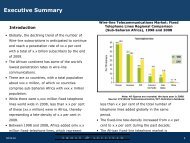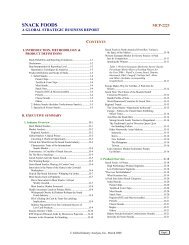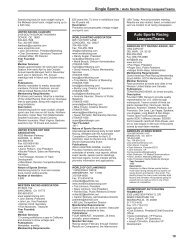the RUSSIA oil & gas competitive intelligence report - Report Buyer
the RUSSIA oil & gas competitive intelligence report - Report Buyer
the RUSSIA oil & gas competitive intelligence report - Report Buyer
You also want an ePaper? Increase the reach of your titles
YUMPU automatically turns print PDFs into web optimized ePapers that Google loves.
Russia Oil and Gas Competitive Intelligence <strong>Report</strong> 2010<br />
Norway<br />
Russia and Norway have agreed to settle a dispute over <strong>the</strong>ir maritime border in <strong>the</strong> Barents Sea, signing<br />
a treaty in September 2010. The dispute, which centred on 176,000sq km of sea, had prevented <strong>the</strong> area<br />
from being fully opened up to <strong>oil</strong> and <strong>gas</strong> exploration. The resolution of <strong>the</strong> dispute will boost efforts to<br />
develop <strong>the</strong> <strong>oil</strong> and <strong>gas</strong> resources of <strong>the</strong> Barents Sea.<br />
The disagreement between <strong>the</strong> two countries, which dates back to around 1970, was based on conflicting<br />
claims to an area of around 176,000sq km in <strong>the</strong> centre of <strong>the</strong> sea. Norway based its claim on <strong>the</strong> 'median<br />
line' principle outlined in <strong>the</strong> UN Convention on <strong>the</strong> Territorial Sea and Contiguous Zones (1964) and <strong>the</strong><br />
UN Convention on <strong>the</strong> Law of <strong>the</strong> Sea (UNCLOS, 1982), which stated that <strong>the</strong> maritime border should be<br />
drawn equidistantly between <strong>the</strong> two countries. The Soviet Union, and later Russia, countered that<br />
Russia's size relative to Norway dictated that it should receive a proportionally larger share of <strong>the</strong> sea and<br />
that it had claimed <strong>the</strong> area under dispute since 1926 using <strong>the</strong> meridian line ra<strong>the</strong>r than <strong>the</strong> median.<br />
The treaty includes provisions for cooperation in <strong>the</strong> development of hydrocarbons in <strong>the</strong> case of any new<br />
discoveries being made that straddle <strong>the</strong> demarcation line. The two sides will also cooperate on<br />
determining <strong>the</strong> outer limit of <strong>the</strong> continental shelf in accordance with UNCLOS.<br />
Qatar<br />
In a March 2010 press statement Gazprom said that Qatar had expressed interest in becoming involved in<br />
projects in <strong>the</strong> Yamal Peninsula at a working meeting between Gazprom's management committee and<br />
<strong>the</strong> Qatari Prime Minister Sheikh Hamad Bin Jassem Bin Jabor al-Thani. According to Gazprom, <strong>the</strong> two<br />
sides discussed potential cooperation in LNG transactions and swap deals between LNG and pipeline <strong>gas</strong><br />
in <strong>the</strong> European and Asia-Pacific markets. In addition Gazprom claimed that <strong>the</strong> Qatari delegation had<br />
expressed interest in projects in <strong>the</strong> Yamal Peninsula, particularly in <strong>the</strong> possibility of commercialising<br />
<strong>the</strong> Tambeyskoe <strong>gas</strong> fields through <strong>the</strong> Yamal LNG project.<br />
Qatar's discussion of <strong>gas</strong> cooperation with Russia will sound worrying to European <strong>gas</strong> consumers, which<br />
have taken advantage of <strong>the</strong> changing differential between LNG and pipeline <strong>gas</strong> prices to drive down <strong>the</strong><br />
cost of energy imports. By cooperating over pricing <strong>the</strong> two countries could benefit as European <strong>gas</strong><br />
demand recovers in <strong>the</strong> aftermath of <strong>the</strong> global economic downturn.<br />
Belarus<br />
Russia and Belarus have had several disputes over energy supplies and pricing since 1991 when <strong>the</strong> latter<br />
became independent. As a former Soviet Union country, in <strong>the</strong> early 2000s Belarus received <strong>gas</strong> at a price<br />
of around US$46/mcm from Russia, a figure far below <strong>the</strong> market rate. In late 2006, however, as part of a<br />
more general policy of reducing energy subsidies to former Soviet satellites, Russia announced that it<br />
would increase <strong>gas</strong> prices, prompting Belarus to introduce an <strong>oil</strong> transit fee that led to Russia temporarily<br />
cutting off its supplies.<br />
© Business Monitor International Ltd Page 12









